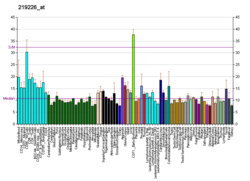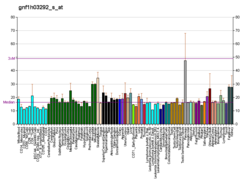CDK12
CDK12 cyclin-dependent kinase 12 is a protein kinase that in humans is encoded by the CDK12 gene.[5][6][7] This enzyme is a member of cyclin-dependent kinase protein family.
References
[edit]- ^ a b c GRCh38: Ensembl release 89: ENSG00000167258 – Ensembl, May 2017
- ^ a b c GRCm38: Ensembl release 89: ENSMUSG00000003119 – Ensembl, May 2017
- ^ "Human PubMed Reference:". National Center for Biotechnology Information, U.S. National Library of Medicine.
- ^ "Mouse PubMed Reference:". National Center for Biotechnology Information, U.S. National Library of Medicine.
- ^ Nagase T, Ishikawa K, Suyama M, Kikuno R, Hirosawa M, Miyajima N, Tanaka A, Kotani H, Nomura N, Ohara O (May 1999). "Prediction of the coding sequences of unidentified human genes. XII. The complete sequences of 100 new cDNA clones from brain which code for large proteins in vitro". DNA Res. 5 (6): 355–64. doi:10.1093/dnares/5.6.355. PMID 10048485.
- ^ Ko TK, Kelly E, Pines J (Oct 2001). "CrkRS: a novel conserved Cdc2-related protein kinase that colocalises with SC35 speckles". J Cell Sci. 114 (Pt 14): 2591–603. doi:10.1242/jcs.114.14.2591. PMID 11683387.
- ^ "Entrez Gene: CDK12 cyclin-dependent kinase 12".
External links
[edit]- Human CDK12 genome location and CDK12 gene details page in the UCSC Genome Browser.
Further reading
[edit]- Nakajima D, Okazaki N, Yamakawa H, et al. (2003). "Construction of expression-ready cDNA clones for KIAA genes: manual curation of 330 KIAA cDNA clones". DNA Res. 9 (3): 99–106. doi:10.1093/dnares/9.3.99. PMID 12168954.
- Wissing J, Jänsch L, Nimtz M, et al. (2007). "Proteomics analysis of protein kinases by target class-selective prefractionation and tandem mass spectrometry" (PDF). Mol. Cell. Proteomics. 6 (3): 537–47. doi:10.1074/mcp.T600062-MCP200. PMID 17192257. S2CID 40974821.
- Olsen JV, Blagoev B, Gnad F, et al. (2006). "Global, in vivo, and site-specific phosphorylation dynamics in signaling networks". Cell. 127 (3): 635–48. doi:10.1016/j.cell.2006.09.026. PMID 17081983. S2CID 7827573.
- Beausoleil SA, Villén J, Gerber SA, et al. (2006). "A probability-based approach for high-throughput protein phosphorylation analysis and site localization". Nat. Biotechnol. 24 (10): 1285–92. doi:10.1038/nbt1240. PMID 16964243. S2CID 14294292.
- Kimura K, Wakamatsu A, Suzuki Y, et al. (2006). "Diversification of transcriptional modulation: large-scale identification and characterization of putative alternative promoters of human genes". Genome Res. 16 (1): 55–65. doi:10.1101/gr.4039406. PMC 1356129. PMID 16344560.
- Beausoleil SA, Jedrychowski M, Schwartz D, et al. (2004). "Large-scale characterization of HeLa cell nuclear phosphoproteins". Proc. Natl. Acad. Sci. U.S.A. 101 (33): 12130–5. Bibcode:2004PNAS..10112130B. doi:10.1073/pnas.0404720101. PMC 514446. PMID 15302935.
- Colland F, Jacq X, Trouplin V, et al. (2004). "Functional proteomics mapping of a human signaling pathway". Genome Res. 14 (7): 1324–32. doi:10.1101/gr.2334104. PMC 442148. PMID 15231748.
- Strausberg RL, Feingold EA, Grouse LH, et al. (2003). "Generation and initial analysis of more than 15,000 full-length human and mouse cDNA sequences". Proc. Natl. Acad. Sci. U.S.A. 99 (26): 16899–903. Bibcode:2002PNAS...9916899M. doi:10.1073/pnas.242603899. PMC 139241. PMID 12477932.


 French
French Deutsch
Deutsch




